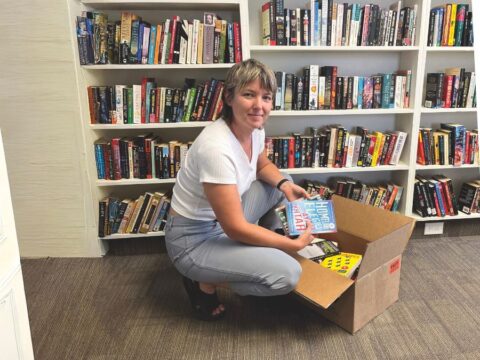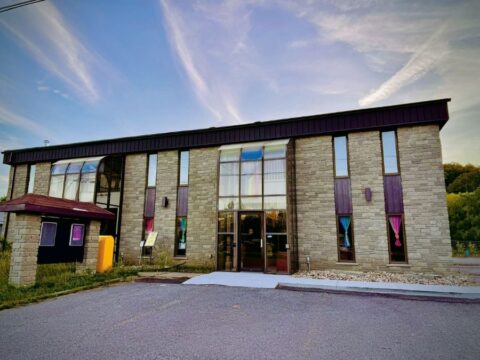Fanny Kaekat and Hortencia Zhagüi work with organizations representing Indigenous Peoples in Ecuador and are deeply concerned about the free-trade agreement that Ecuador and Canada are currently negotiating. At least 15 Canadian mining companies are currently active in the country. But activists say the companies’ actions are leading to human rights abuses, deforestation, water pollution and the division of Indigenous territory.
Kaekat is a member of the Shuar Arutam People and Amazonian Women Defenders of the Rainforest collective. The Shuar Arutam People filed a complaint at the B.C. Securities Commission earlier this fall against Canadian-based Solaris Resources. The complaint alleged the company failed to tell shareholders about ongoing Indigenous opposition to its Warintza copper mine project, court decisions that could threaten it and other material risks. Zhagüi is an activist from the Kimsakocha Women’s School of Agroecology, a food sovereignty organization, and a representative of the Board of Potable Water Administrators of Victoria del Portete and Tarqui.
You may unsubscribe from any of our newsletters at any time.
They were in Canada earlier this fall as part of a delegation of Indigenous women and land defenders voicing concerns about the free-trade agreement, and spoke to Broadview intern Nathalie Leveille over Zoom. Amnesty International Canada, the Canadian Centre for Policy Alternatives, the Canadian Labour Congress, MiningWatch Canada, and KAIROS: Canadian Ecumenical Justice Initiatives led organization efforts for the tour. This interview was translated from Spanish.
Nathalie Leveille: How has this conflict with the Canadian mining companies affected each of you individually? Why are you concerned about the ongoing trade negotiations?
Fanny Kaekat: I’m from the Shuar Arutam People’s organization. We stand in defence of the territories. We started working with Socio Bosque [a government program that gives landowners money to protect the forest], and, along with the Ministry of the Environment, they said they were going to provide funds for conserving the environment, but they didn’t. And then the territorial conflict started. They said we should not be defending the territories. And they started taking our territory.
These mining projects are sitting on the mountain range that is very important for our subsistence. Companies destroy the entire jungle so that they can get to their mining project.
They’re dividing family members because there are some who actually support the mining corporations while others stand against. Some of our own family members started working for those same mining companies. When, in fact, it is our land and they should be working for us.
This free-trade agreement is not going to be good for us. This is leading us to death. The mining companies are only waiting for the government to sign and they will begin the project, but they don’t realize how many lives are going to be impacted. All of these territories are just going to become open-pit mining places. There are so many laws in place that defend our rights in Ecuador, but the Ecuadorian president doesn’t take that into consideration.
More on Broadview:
- Canadian mining companies are destroying communities in the Philippines but this United Church mission team is determined to help
- Our children are risking their lives on the front lines of a burning planet
- Is Canada ready to play its part in the global climate refugee crisis?
Hortencia Zhagüi: I am from Azuay Province and the Páramo de Kimsakocha, a unique ecosystem that is also being affected by the mining companies. There are four different rivers that support our water system, our vegetation, our agriculture, our farming and our wildlife.
We’ve been standing in resistance against the mining companies for 30 years because we want them to stop exploiting our territory. All of the toxic chemicals are actually going into our rivers and river basins. The chemicals also seep into the soil. And so that’s why we’re worried.
NL: What kind of conduct have you observed from Canadian mining companies?
FK: They are not respecting our organizational structure as Shuar Arutam People. Our leaders say who is allowed to come into our territories and who is not. And these companies haven’t even talked to them. They are actually exploiting our compañeros [fellow citizens]. There are poor working conditions, and nobody really talks about it. People have died. Nobody talks about the rights of the workers, water, animals, environment.
So much violence and so many violations are taking place. There’s no real access to drinking water. And sometimes our brothers and sisters don’t think about this. Sometimes they tell us that we are opposing economic development, but that’s not the case. We’re struggling to protect our territories so that our children, our grandchildren, are able to live a life that is healthy, able to work the territory the way that we have.
NL: Have you both tried to speak out against the mining companies in Ecuador before deciding to raise awareness in Canada? Do activists face risks if they speak out against Canadian mining operations in Ecuador?
FK: We have raised our voices from our own territories, but they are lost or they are just heard in Ecuador, and that is why we thought it was important to come here so that our voices are heard. There are activists in [Quito, Ecuador’s capital] who stand with us, even if we’re not able to go there ourselves. We live at a mountain range in a jungle, so going to the city is quite complicated. CONAIE [Confederation of Indigenous Nationalities of Ecuador] is our mother organization and continues to stand in resistance. Activists have been threatened, but it’s admirable that the people who live in the city protest in solidarity with us. We know they are at risk for standing up just the same as we are.
HZ: What we’ve done is that thousands of people, the Board of Portable Water Administrators of Victoria del Portete and Tarqui have organized and we hold protests. Of course, the police, the government, the military reject us. They try to keep us quiet. More than 84 percent of the people have said that they don’t want mining companies there. But the government and the corporations really don’t care about what we have to say. The Ecuadorian government just wants to protect the capitalists and the investors.
NL: What kind of reactions have you received in your meetings in Canada?
HZ: I’m very thankful to all of the organizations that have supported us so that we are able to be here and raise our voice as women. We’ve received so much support from the Indigenous communities within Canada as well, who have a similar struggle.
FK: People have listened to our situation, and when they saw that we were here to inform them about what was happening on our territories, they have told us that we are not alone. They are motivating us because they said that even though we are far away, they’re not going to abandon us! And that gives us courage to continue moving forward.
NL: How can everyday people (i.e., the people reading this interview) help your cause?
FK: Personally, I think the best thing Canadian citizens could do is ask their own leaders to remove the mining companies from our sectors, to just leave our territories alone, to end the exploration and the exploitation and the destruction. They need to improve the quality of life of the communities that are currently there.
HZ: We want the government to know that we are talking about the realities of what’s really going on on the ground. They’re listening to the mining companies who are actually lying. We want members of Parliament to hear this so they know that we are telling the truth, because we no longer want any more violence on our territories in our country.
This interview has been condensed and edited for clarity. It was originally conducted in Spanish.
Nathalie Leveille is a recent Broadview intern and a student at Humber College.














